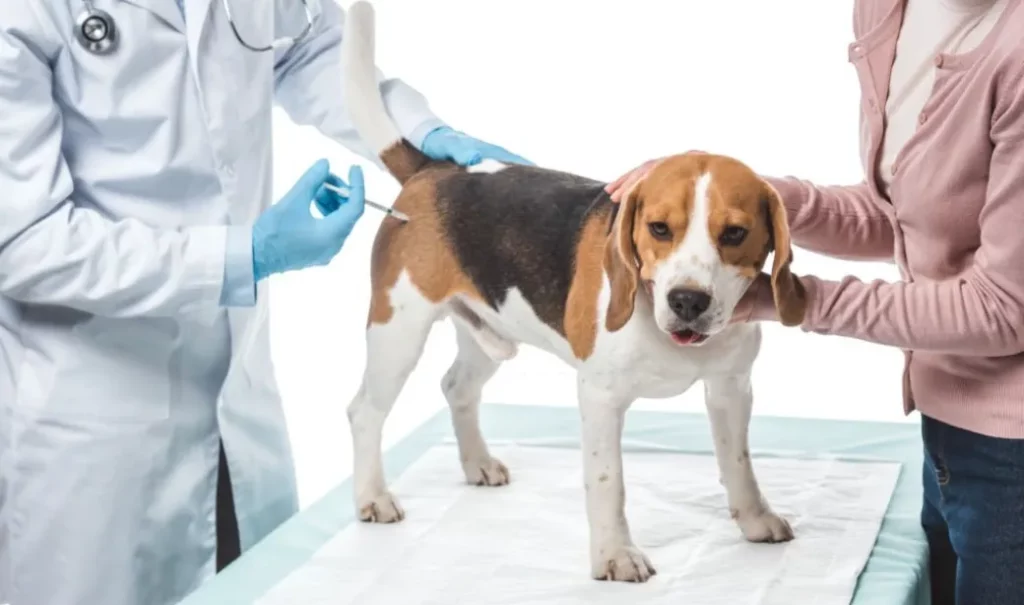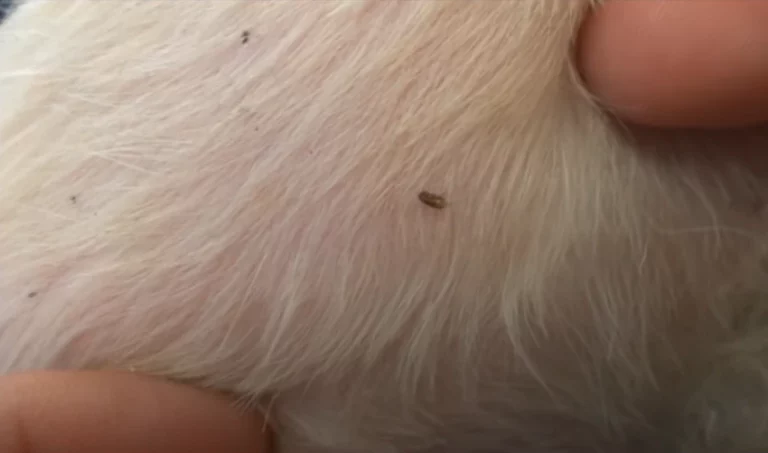What Can I Give My Dog For Pain After Shots?
Dogs are not just pets but other members of the family. If you, like many owners, have to give your pet a shot, you may be worried about any pain he might experience afterward.
What Can I Give My Dog For Pain After Shots? You can give them painkillers or the prescribed medicines to relieve the pain. It would help if you took care of your dog after shots by being with him and taking care of the vaccinated body part.

Luckily, there is often an easy solution: your dog can get pain relief by giving him something that provides comfort. After vaccine shots, you can give them a pet-safe petting or a pet toy that can be chewed on to relieve their pain.
Simply squirting a little water onto the injection site can ease discomfort caused by vaccinations and other medication.
Use the human version of this trick: setting a bottle of water next to your dog during shots. Your dog will feel coolness and comfort, which will help keep him calm and reduce his anxiety.
So now you know how to help ease your dog’s pain after vaccination shots. Treats or toys he can bite down on help keep him distracted while he reacts to the shot. This is especially useful if you need to give multiple doses of medication.
Table of Contents
- How Can I Comfort My Dog After Shots?
- Is It Normal For A Dog To Be In Pain After Shots?
- How To Tell If A Dog Is In Pain After Shots?
- Why Is My Dog Shaking After Getting Shots?
- Can I Give My Dog Baby Aspirin After Vaccinations?
How Can I Comfort My Dog After Shots?
If your little friend has visited the vet lately, you might have been told that your pup needs to take some time off from being active. You might be wondering what to give them for pain relief after shots.
The good news is there are plenty of options for you and your dog. There are ways to soothe a scared and uneasy canine, such as having treats nearby or playing with their favorite toy in their room or near the place they usually rest.
Also, try to be with them to take care of them. Finally, you can rub their body to provide comfort from the pain.
Keep trying, and don’t give up until they’re calm again. You can also put them in a crate or carrier since the familiar scent can soothe them. Before leaving the office, ask the vet if giving your dog some painkillers is OK.
Make sure your dog has a nice, warm bed to rest their head on. When you get home, try to play and exercise with your pet.
They are usually nervous after getting shots, and the last thing they need is to sit around the whole day feeling sorry for them.
You will have a better relationship with your pet if you explain things to them and make sure you don’t leave them alone for long periods afterward.
Also, take care of their food and make sure all the food is accessible when you are not home. And do not forget to give their medicines on time to relieve pain.
Is It Normal For A Dog To Be In Pain After Shots?
Yes, pain is expected in the dog after giving them any vaccine shots. This is a normal response for a dog. It is in the dog’s best interest for you to be there for them during this time.

To help your dog feel better and heal quickly after the shot, try these tips and methods.
- Bathing your dog with a damp cloth will help cool them down and make them feel more comfortable. Giving your dog a cool bath also helps ease pain from any vaccines. This is especially important if you have used any convulsion-inducing or anesthetic drugs.
- Calmly putting your hands on your dog’s back, under its belly, will create a calming effect for the animal. Just this simple act of kindness can help them to feel much better.
- Apply a cool compress to any areas of their body that have redness and swelling.
- Gently wash the vaccine site with a mild soap bar and use a very soft cloth or sponge. This will help clean out any bacteria or virus from the injection site and makes it easier for your dog to heal quickly. Do not scrub around the injection site, which may re-open the wounds and delay healing.
- If your dog is frantic because they cannot find you, try showing yourself in a different room; these are usually good distractions for them. Try to distract them from the pain by taking them for a walk or a ride in the car.
Giving your dog any medication prescribed by your veterinarian can reduce pain and make your dog feel better.
Why Is My Female Puppy Peeing Every 5 Minutes? [Vet Tips & Advice]
puppiesdiary
How To Tell If A Dog Is In Pain After Shots?
If you have a new puppy or are concerned about your current dog’s discomfort after being at the vet, you may be wondering how to tell if your dog is in pain.
Here are some signs of possible pain in dogs:
- Dilated pupils
- Increased heart rate
- Increased breathing
- Trembling paws or tail
- Raised fur on the back of the neck and between the shoulder blades
- Difficulty walking, leaning against walls, or sitting down.
For some dogs, this might manifest as becoming more active than usual. Check with your vet if you notice these signs after bringing your dog home from a vaccination appointment.
Diagnosing pain in a dog can be very difficult. Still, it is essential to do everything you can to help relieve your dog’s pain and give them the most comfortable recovery possible.
Your vet may prescribe a pain reliever such as Carprofen. Some dogs may benefit from one medication or another. Ask your vet to explain these medications’ dosing regimens and side effects.
Many dogs will shake their head, whimper, and lick their lips, panting or licking their tongue while vaccinated by injection of vaccines into the muscle.
This is perfectly normal, as a high muscle temperature around the injection site is good. A dog’s immune system should kick in within moments and kill off any germs in the vaccine.
The dog should feel slight warmth around the vaccination site and may have mild discomfort for a few minutes afterward. Contact your vet if your dog shows lethargy and discomfort after vaccination.
Why Is My Dog Shaking After Getting Shots?
There are many reasons to explain this dog’s condition shaking. It is common for all dogs to get anxious and stressed about the hospital and start shivering or trembling out of fear.

Some dogs start shaking because they might suffer from the side effects of shots and fever; shaking is a normal part of side effects that are not worrisome causes.
If your dog is shaking from the shots, you can help him recover by giving him a warm bath. This will help relieve some of the pain and inflammation.
After your pet is comfortable again, monitoring your dog’s health to see if any of these symptoms persist is essential.
These include high fever, lack of appetite, lethargy/weakness, swelling around the injection site, and discharge or a strong odor emanating from it. If any signs of illness are present, contact your vet immediately.
Contact your veterinarian if you have questions or concerns about your dog’s post-vaccination tremors.
They will tell you if there is a serious medical issue or a mild reaction to the vaccines. If your dog continues to have slight tremors after a day or two, this can also indicate other health problems in dogs.
Your vet can perform a physical examination and run diagnostic tests if they suspect your dog may have another medical condition causing the tremors.
puppiesdiary
Can I Give My Dog Baby Aspirin After Vaccinations?
Do you know if it’s safe for your dog to take baby aspirin after vaccination? Although no published studies compare the effects of high-dose or baby aspirin on dogs, some advocate giving your pet a pain reliever like Tylenol or ibuprofen to help manage adverse reactions.
Baby aspirin is usually fine to give your dog after vaccinations because it doesn’t contain aspirin’s main ingredient, acetylsalicylic acid.
Instead, baby aspirin contains salicylates, a group of chemicals that includes the same chemicals found in ASA.
However, when it comes to baby aspirin specifically, there is a difference between that and regular ASAs.
One thing that makes a difference is how quickly the drug passes through your pet’s body.
Because it contains salicylic acid, ASA passes through your dog’s body faster than baby aspirin.
It does mean that if you give your dog Tylenol or another over-the-counter pain reliever after a vaccination, it will have less risk of not working as it should.
Because baby aspirin passes through your pet’s body more slowly, it is less likely to work like it should because the pain reliever has not had time to reach your dog’s organs and tissues.
The bottom line is, if you are looking for the best pain reliever for your dog after vaccinations, Tylenol or ibuprofen may be a better option than baby aspirin because it will be able to reach your pet’s body much faster.
Also, consider that what works for one dog may not work for another, so try to monitor your pet as much as possible after getting shots.

![What does it mean if a dog has sticky urine? [8 Reasons reveal] 4 What does it mean if a dog has sticky urine? [8 Reasons reveal]](https://www.puppiesdiary.com/wp-content/uploads/2023/04/What-does-it-mean-if-a-dog-has-sticky-urine-768x457.webp)




